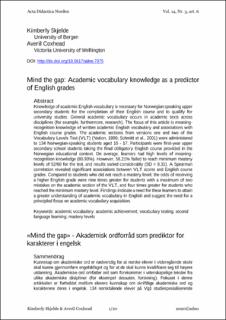| dc.contributor.author | Skjelde, Kimberly | |
| dc.contributor.author | Coxhead, Averil | |
| dc.date.accessioned | 2021-05-03T07:37:02Z | |
| dc.date.available | 2021-05-03T07:37:02Z | |
| dc.date.created | 2020-10-22T11:29:56Z | |
| dc.date.issued | 2020 | |
| dc.Published | Acta Didactica Norden (ADNO). 2020, 14 (3), . | |
| dc.identifier.issn | 2535-8219 | |
| dc.identifier.uri | https://hdl.handle.net/11250/2740711 | |
| dc.description.abstract | Knowledge of academic English vocabulary is necessary for Norwegian speaking upper secondary students for the completion of their English course and to qualify for university studies. General academic vocabulary occurs in academic texts across disciplines (for example, furthermore, research). The focus of this article is meaningrecognition knowledge of written academic English vocabulary and associations with English course grades. The academic sections from versions one and two of the Vocabulary Levels Test (VLT) (Nation, 1990; Schmitt et al., 2001) were administered to 134 Norwegian-speaking students aged 15 - 17. Participants were first-year upper secondary school students taking the final obligatory English course provided in the Norwegian educational context. On average, learners had high levels of meaningrecognition knowledge (80.93%). However, 58.21% failed to reach minimum mastery levels of 52/60 for the test, and results varied considerably (SD = 8.31). A Spearman correlation revealed significant associations between VLT scores and English course grades. Compared to students who did not reach a mastery level, the odds of receiving a higher English grade were nine times greater for students with a maximum of two mistakes on the academic section of the VLT, and four times greater for students who reached the minimum mastery level. Findings indicate a need for these learners to attain a greater understanding of academic vocabulary in English and suggest the need for a principled focus on academic vocabulary acquisition. | en_US |
| dc.language.iso | eng | en_US |
| dc.rights | Attribution-NonCommercial-NoDerivatives 4.0 Internasjonal | * |
| dc.rights.uri | http://creativecommons.org/licenses/by-nc-nd/4.0/deed.no | * |
| dc.title | Mind the gap: Academic vocabulary knowledge as a predictor of English grades | en_US |
| dc.type | Journal article | en_US |
| dc.type | Peer reviewed | en_US |
| dc.description.version | publishedVersion | en_US |
| dc.rights.holder | Copyright 2020 The Authors | en_US |
| dc.source.articlenumber | 6 | en_US |
| cristin.ispublished | true | |
| cristin.fulltext | original | |
| cristin.qualitycode | 1 | |
| dc.identifier.doi | https://doi.org/10.5617/adno.7975 | |
| dc.identifier.cristin | 1841422 | |
| dc.source.journal | Acta Didactica Norden (ADNO) | en_US |
| dc.source.40 | 14 | |
| dc.source.14 | 3 | |
| dc.identifier.citation | Acta Didactica Norden (ADNO). 2020, 14(3), 6 | en_US |
| dc.source.volume | 14 | en_US |
| dc.source.issue | 3 | en_US |

